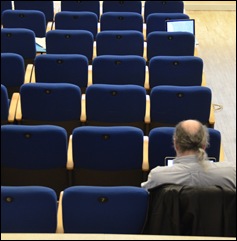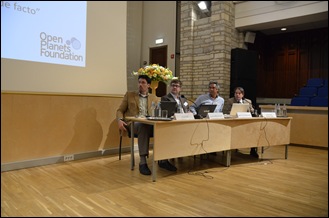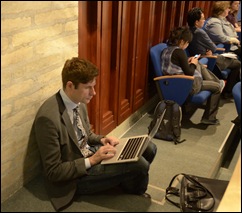 Clifford Lynch of the Coalition for Networked Information has a remarkable talent for analyzing a lot of information and bringing it together in a synthesis. Throughout the conference you could see him sitting quietly somewhere in the audience, digesting what happened, pondering it, and drawing his conclusions (photo right and photo below).
Clifford Lynch of the Coalition for Networked Information has a remarkable talent for analyzing a lot of information and bringing it together in a synthesis. Throughout the conference you could see him sitting quietly somewhere in the audience, digesting what happened, pondering it, and drawing his conclusions (photo right and photo below).
I am not sure that it is entirely appropriate to synthesize the synthesizer, but I do want to give you some highlights from Cliff’s ‘opinionated synthesis’ (the highlights themselves, of course, being opinionated as well …).
‘Yes, alignment  is very necessary,’ Cliff started out, because:
is very necessary,’ Cliff started out, because:
- Working in the same direction makes much needed collaboration possible;
- Everybody will benefit from mutual support and shared learning.
- What Cliff did not hear enough about at the conference: Collectively we can make a much more effective case towards governments, funders and society at large. (Cliff: ‘It is of fundamental importance that we clarify and educate.’)
The six axes of alignment dealt with in the conference interrelate in very complicated ways, of course, but Cliff took the conference outline as his point of departure anyway.
- Testing & benchmarking are very important topics. We need to learn to do this better and we need to introduce scale into the equation. This ties into the economic angle: we need to test commercial products.
- ‘There is some glib talk about interoperability’; we need to be more specific: what? how? what goals?
- What Cliff did not hear enough about at the conference, was the danger of a monoculture. We must be careful not to align too much; we need diversity to further develop the field.
- Two areas deserve more attention: the bit storage layer (how to trade off between partners? what is the role of commercial services? what about standards?; and, secondly, security and integrity. ‘Just imagine the impact if somebody would raid and Wikileak all the embargo collections we hold …’ The stakes are substantial!
Organizational panel
- Cliff thought that the honesty displayed by yours truly (see blog) was ‘wonderful’, and contained ‘lessons for all’. I humbly thank Cliff for this comment – and hope that others will be motivated to follow the example.
- We are moving from cooperation in short-term projects into cooperation in fundamental, on-going programs, which is a very good thing.
- What Cliff missed: information about aligning strategies within national borders: what variation is there in assigning levels there. He also missed more conversation about the question of replication – what choices have to be made? What about autonomy and interdependence?
- Some standards may not be DP-specific, but as they characterize the materials we deal with, they are relevant.
- There is a thicket of analytic standards – and maybe we are rushing prematurely into some of them. Perhaps it is better to talk about ‘best practices’ for the time being.
Legal panel
- The legal issues are becoming more dominant all the time.
- Cliff was impressed by the report of the Comité des sages and the efforts it reflects to define collective EU principles on copyright.
- Cliff suggested that a bunch of smart people from both sides of the ocean get together to drive policy on copyright matters. [Would not that be great – is it feasible?]
Educational panel
- A lot of curricula feed back into national programs.
- We are focused on educating professionals – but we should also start training people outside our field and the general public. The ‘national preservation week’ launched by the Library of Congress is a great initiative to Make the Case for digital preservation.
- A very important distinction: digitization is very different from digital preservation when it comes to funding. The latter has no immediate payoffs and is thus harder to fund.
- We did not talk much about scale; more attention required, in combination with cost models.
- When it comes to sustainability, the very fact that we define certain goods as public is in itself a sustainability strategy.
- Instability in public funding is a nightmare!
- We should pay some more attention to the connection between risk management and costs both for physical and for digital materials.
The elephants in the room
According to Cliff, the elephant in the room (a topic that is avoided by implication) is the data deluge in e-science, Big Data. As e-science drives both education and technology, this is very relevant. But national libraries are not paying much attention to what happens in Big Data.
 Perhaps a smaller elephant is audiovisual content, both physical and digital. This information is expensive to maintain, and AV materials seem to be the step children of national collection strategies.
Perhaps a smaller elephant is audiovisual content, both physical and digital. This information is expensive to maintain, and AV materials seem to be the step children of national collection strategies.
Another elephant: What is the extent of born-digital material – government, commercial, social media. We do not have a good assessment of this content yet.
If we ever have another conference like this, Cliff suggested that we add two more axes to the discussion: Making the Case towards funders and the public at large; and: Strategic alignment of collection policies (personal records, social media, games, news: who preserves what?).
(PS: Just in case you wonder: ANADP11, blog post no. 8 is still to come; I am waiting for some necessary information.)



1 opmerking:
Thanks for the excellent synthesis, I was looking for it since I could not take notes at the conference.
Ah, and I am also waiting for post #8 ;-)
Een reactie posten